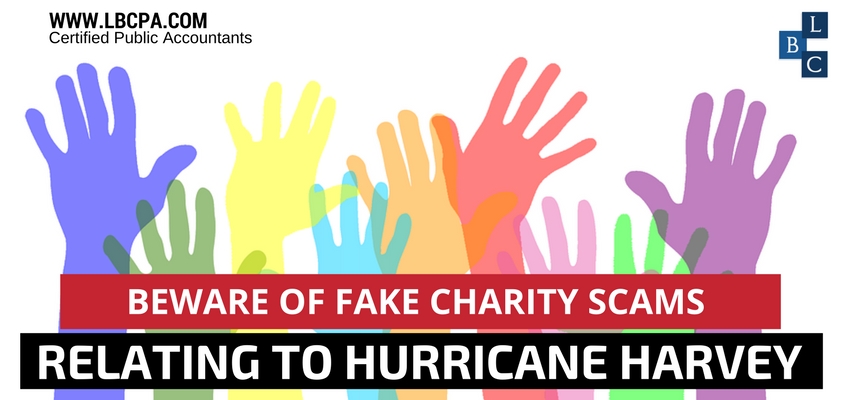LBCPA News 
Click here to go back
Beware of Fake Charity Scams Relating to Hurricane Harvey

WASHINGTON ― The Internal Revenue Service today issued a warning about possible fake charity scams emerging due to Hurricane Harvey and encouraged taxpayers to seek out recognized charitable groups for their donations.
While there has been an enormous wave of support across the country for the victims of Hurricane Harvey, people should be aware of criminals who look to take advantage of this generosity by impersonating charities to get money or private information from well-meaning taxpayers. Such fraudulent schemes may involve contact by telephone, social media, e-mail or in-person solicitations.
Criminals often send emails that steer recipients to bogus websites that appear to be affiliated with legitimate charitable causes. These sites frequently mimic the sites of, or use names similar to, legitimate charities, or claim to be affiliated with legitimate charities in order to persuade people to send money or provide personal financial information that can be used to steal identities or financial resources.
IRS.gov has the tools people need to quickly and easily check the status of charitable organizations.
The IRS cautions people wishing to make disaster-related charitable donations to avoid scam artists by following these tips:
Be sure to donate to recognized charities.
Be wary of charities with names that are similar to familiar or nationally known organizations. Some phony charities use names or websites that sound or look like those of respected, legitimate organizations. The IRS website at IRS.gov has a search feature, Exempt Organizations Select Check, through which people may find qualified charities; donations to these charities may be tax-deductible.
Don’t give out personal financial information — such as Social Security numbers or credit card and bank account numbers and passwords — to anyone who solicits a contribution. Scam artists may use this information to steal a donor’s identity and money.
Never give or send cash. For security and tax record purposes, contribute by check or credit card or another way that provides documentation of the donation.
Consult IRS Publication 526, Charitable Contributions, available on IRS.gov. This free booklet describes the tax rules that apply to making legitimate tax-deductible donations. Among other things, it also provides complete details on what records to keep.
Taxpayers suspecting fraud by email should visit IRS.gov and search for the keywords “Report Phishing.”
More information about tax scams and schemes may be found at IRS.gov using the keywords “scams and schemes.” Details on available relief can be found on the disaster relief page on IRS.gov.
If you have any questions regarding accounting, domestic taxation, international taxation, IRS representation, U.S. tax implications of Real Estate transactions or financial statements, please give us a call at 305-274-5811.
Source: IRS






